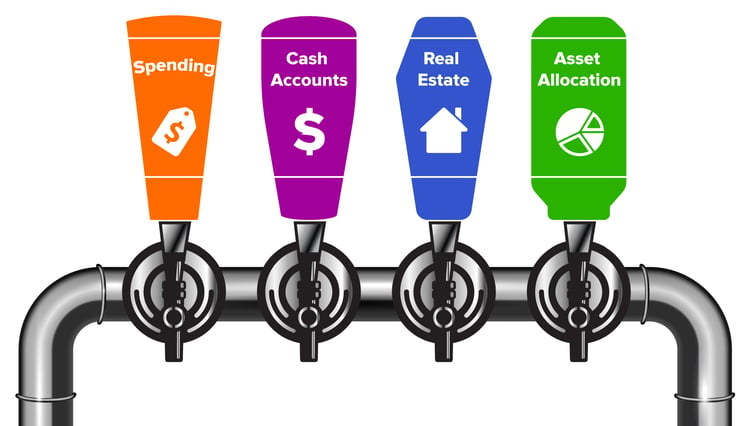What’s that saying…oh yeah: The best-laid plans of mice and men often go awry. So true it is. That’s because, regardless of how we wish differently, we can only control what we can control.
Take a 6-year-old's dance recital, for example. They practice the same dance every class for months on end. You would have thought they’d be able to perform it in their sleep. But once on stage, inevitably, they’re looking around, unsure of what to do—some kids decide to run around, and others sit, some hands fly in the air while others are tapping their feet. It’s endearing for the audience members, but the teachers likely want to pull out their hair!
While a 6-year-old’s dance debacle is a hilarious instance of plans going awry, when the market falls 10% or 20%, and you’re about to retire, that’s certainly nothing to laugh about. So if you’re set to retire, what should you do?
The obvious answer
If you ask most people, and even many Wealth Advisors, the most obvious answer may seem to stay working and delay retirement. And for some, that may be an acceptable solution—whether they remain working full-time or cut back their schedule to part-time—working may keep the income fulfilled. Even many employers would jump at the chance to hold on to a seasoned veteran—someone who knows how to do the job without training—especially in the current tight labor market.
But if the decision to retire is based on a health or family need rather than a choice, this might not be feasible or desirable. Nor may it be necessary for some. For example, if your family or health history indicates that retirement longevity is not a concern, then you may still be able to retire despite the recent hit to your portfolio. However, if you expect to have a several decades-long retirement and still want or need to retire in the current market conditions, then you should determine what additional levers you have to find income in a down market.
Other levers to access in a down market
History has shown us that most market drawdowns are generally short-lived.1 But if you retire and your portfolio is down, you probably don’t want to draw upon investment income by selling securities when they are depressed. Instead, you may want to stay invested to benefit from a potential market recovery.
But we’re not magicians, so we can’t manifest income out of thin air. So you’ll probably need to adjust your wealth plan by looking at both sides of the equation—your expenses and assets. Here are four ways to potentially match your retirement income with your living costs without needing to sell your stocks at depressed levels.
4 retirement plan levers in a down market

Lever 1: Adjust spending. It’s a natural reaction for people to pull back on spending during lean times, then readjust as prosperity returns. But since retirement income tends to be fixed, if you’re retiring with fewer assets than you expected to have, you may need to cut back on extraneous spending for good. We recommend you start by laying out your essential expenses. Then determine and rank your discretionary costs by priority or “want” order. This exercise will help you first prioritize your needs, then rank your wants. If your current retirement income can satisfy your needs and wants over your projected life span, then your plan should still be on track. But if not, you may need to cut spending or pull another lever to make ends meet.
Lever 2: Dip into cash accounts. You typically want to avoid selling investments during a market lull. So to bridge the income gap and wait for the market to hopefully recover, consider pulling money out of your liquid assets, such as bank accounts, certificates of deposit, and money market funds. Or, if you have a life insurance policy with a cash value, you could access those funds. This way, if your retirement plan was on track before the market dip, staying invested gives your investments a chance to recover and potentially grow as your original plan expected.
Lever 3: Sell your real estate. This is a scary one for many people and a solution we don’t always recommend. But you may need to sell your house if you have a significant shortfall between your spending needs and income generated from your retirement sources. Not only do you benefit from the appreciation of the property over what you paid, but it may provide an opportunity to relocate to a better climate, a more retiree-friendly environment, or a cheaper state. Or maybe it’ll push you towards a much-needed downsize.
Lever 4: Tweak your asset allocation. We learn a lot about ourselves in times of stress. One of the lessons many investors learn when the market heads south is that their tolerance for risk may not be as high as they believed when the market was going gangbusters. In a survey we conducted in July 2022, more than half the respondents said that while they’re still risk takers, it’s in moderation and lower than a year ago. So if your retirement plan has taken a step back, you may need to revisit your asset allocation. Some of you may need to dial back your risk, while others should ratchet it up. It all depends on your situation, including how long you expect to live in retirement and your spending needs.
You should also re-evaluate your level of diversification. Do you have non-equity assets so that you have other ways to generate income when the stock market falters? This may include bonds or commodities.
This exercise results in setting up your portfolio for the future. Because if you live one, two, or more decades in retirement, there’s an almost 100% chance that this will not be the only bear market your retirement plan faces.
Being prepared is sage advice
Of course, it would be wonderful if your retirement plans are not derailed by a market downturn. One way to insulate from having an income squeeze and needing to sell depressed assets is to set aside cash for everyday expenses. We call this a cash carve-out, where we recommend having at least three years’ worth of expenses available in a liquid account. Those monies should be unaffected by the volatility of the market, so you shouldn’t be forced into an undesirable decision—like delaying retirement or selling assets when they’re way down.

Like what you're reading?
Join the thousands of readers getting stories like this delivered straight to their inbox every Thursday — for free. Give it a spin, enter your email to sign up.
Footnotes
1Factset, Morningstar, First Trust, Bloomberg. Data measured daily from Apr. 29, 1942 through Mar. 31, 2022 for the S&P 500
Related Articles

Retirement Planning for Public Employees
Are you eligible to retire from serving as a public employee, but wondering if you can afford to...

Making Sense of Required Minimum Distributions
The government wants you to save for retirement. That’s why many people believe retirement savings...

2 Layers of a Sustainable Retirement Investment Strategy
What does your pie-in-the-sky retirement look like? For some, it’s buying an RV and traveling the...
